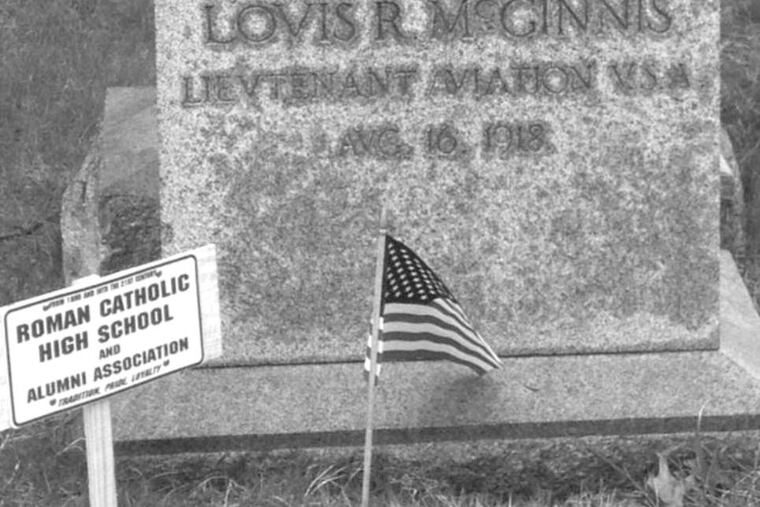Search for alumni fallen in WWI conjures up 1918
Then beat the drums slowly, play the fifes lowly, Sound the death march as you carry me along, And fire your muskets right over my coffin,

Then beat the drums slowly, play the fifes lowly,
Sound the death march as you carry me along,
And fire your muskets right over my coffin,
For I'm a young soldier cut down in his prime.
- "The Soldier Cut Down in His Prime,"
an old Irish ballad
Chris Gibbons
is a Philadelphia writer
I huddled in the cold rain with my sons, Jack and Ryan, in Yeadon's Holy Cross Cemetery and unfolded the paper that listed the burial registry information of a soldier, Louis Robert McGinnis.
It was Easter, and many of the graves had fresh potted flowers beside them, a welcome respite of color among the drab gray sky and headstones. The tapping of the raindrops on the paper steadily increased, which hastened our search.
"It states that he's in this section here, Section 19, Lot 48, Range 9, but I don't see any markers," I said to my boys as I surveyed the numerous headstones in front of us. "We'll have to split up, each take a row, and hope that we find him."
We searched for nearly 10 minutes before I finally saw the headstone. "I found it!" I yelled. "He's over here."
As my boys hurried over, I noticed that there were no flowers at McGinnis' grave site, and my initial feeling of satisfaction was quickly overwhelmed by an unexpected sense of sadness. Although he died in 1918, I felt that this was someone I knew.
We were there that day because of my ongoing, two-year search for Roman Catholic High School alumni who died in World War I. McGinnis was from the Class of 1913.
Roman's records revealed that 14 alumni died during the first World War, but listed only two names. A third name was found when a relative of that alum contacted me directly. But McGinnis was the first alum I found through a meticulous and time-consuming process of comparing names from old Roman yearbooks to a list of Philadelphians who died during the war.
McGinnis, nicknamed Zeke, was born Aug. 24, 1895. He was one of six sons of Andrew and Anastasia McGinnis, and, like me, his paternal grandparents were Irish immigrants. He lived on 58th Street in Southwest Philadelphia, and before that, on Snyder Avenue in South Philly.
At Roman, McGinnis was a popular kid, and the 1913 yearbook eerily stated: "McGinnis will never be forgotten by the members of the Class of 1913. Not only was he popular among the fellows of his own class, but with the whole student body of R.C.H.S." It also stated that "Lou" was on the track team, won a big race at Fairmount Park as a junior, and was a hit in the school play.
After Roman, he went on to the University of Pennsylvania. In 1917, he joined the Army's new aviation section, a forerunner to the Air Force, and achieved the rank of second lieutenant before he died on Aug. 16, 1918, just eight days shy of his 23d birthday.
The circumstances surrounding his death are unknown. Perhaps he was a fighter pilot and was shot down, or maybe his death was more mundane - during a training exercise or from the deadly 1918 flu pandemic that killed thousands of U.S. soldiers. I'm hopeful that I'll eventually find the answers.
After we found the grave, Ryan ran back to the car and retrieved the small American flag and Roman Catholic High School alumni plaque that we had brought. We fixed them in the ground and observed a moment of silence. I then realized that my search for the lost boys from Roman who died in World War I had reached a level of difficulty that I never anticipated.
I had naively assumed it was simply a search for 11 missing names, but my research had revealed much more. Now, Louis McGinnis was no longer just a name to me. He seemed more like an old friend or classmate, and it made for a poignant moment as Roman alums stood at the grave of another who graduated 100 years prior. "He died a long way from home," I said aloud as we watched the rain pelt his headstone.
We headed back to the car, and while I was proud of my sons for helping me, I certainly wasn't surprised. Jack is a recent Roman graduate, and Ryan is a junior there now. Our school's motto is "Brothers for Life," so they were as determined as I was to find McGinnis' grave.
A graveyard is a changeless place, seemingly immune to the passage of time, and as we drove along the cemetery's narrow path toward the exit, I wondered what it was like on that day in 1918 when Zeke was laid to rest.
Was it a gray, rainy day like today? Were the mourners in attendance able to provide some measure of comfort to his grief-stricken family? Were his former classmates from Roman there?
And did his military honor guard beat the drums slowly, play the fifes lowly, and sound the death march as they carried our brother to his grave?